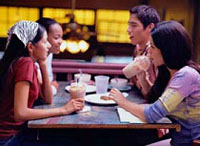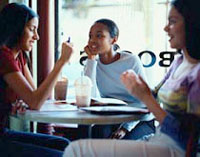
Skip section navigation (navigation may have changed)
Section navigation
Having fun and staying safe

As a teen, your family may give you more responsibilities and the chance to spend more time with your friends. This extra time with your friends may put you in new or different social situations and places. With your parents not around as much, you are making more choices for yourself and will need to keep yourself safe. If you forget about your safety, your fun can quickly turn into danger.
Check out these questions and answers to learn how to stay safe on the go.
- How do I keep myself safe at a party?
- What if someone offers me alcohol or drugs?
- How can I make a safety plan for different social situations?
- What do I do if I am walking in a neighborhood I don't know well?
- What do I do if I am out and someone that I don't know comes up to me?
How do I keep myself safe at a party?  top
top
 New social settings like parties are a fun way for you to spend time with your friends. Most of the time parties are safe, but sometimes things can happen that can make a party a dangerous place to be. It's important to know what to do if a party gets out of control and how to keep yourself safe.
New social settings like parties are a fun way for you to spend time with your friends. Most of the time parties are safe, but sometimes things can happen that can make a party a dangerous place to be. It's important to know what to do if a party gets out of control and how to keep yourself safe.
- Never walk away with strangers.
- Never be alone with someone who has been drinking or taking drugs.
- Don’t drink alcohol or do drugs.
- Tell your parents and friends where you are going.
- Never get in a car with someone who has been drinking or doing drugs.
What if someone offers me alcohol or drugs?  top
top
 You’re more likely to be offered alcohol or drugs by a friend than a stranger. It’s okay to say no to friends. Many people are focused on themselves, so they won’t be as worried about what you’re doing as you may think. Below are eight great ways to turn down an offer.
You’re more likely to be offered alcohol or drugs by a friend than a stranger. It’s okay to say no to friends. Many people are focused on themselves, so they won’t be as worried about what you’re doing as you may think. Below are eight great ways to turn down an offer.
- No, thanks.
- I’m not into that.
- Alcohol’s not my thing.
- I don’t feel like it — do you have any soda?
- I’m okay. Thanks.
- No, I’m training for _______.
- No, I’m on the _______ team so I don’t want to risk it.
- No. I gotta go soon.
You can set an example for others by staying away from drugs and alcohol. You might be worried about not being “cool” if you don’t try drugs or alcohol, but you can start a different, more real kind of “cool” by being looked up to as someone who makes confident choices for you.
 Check out one teenager's advice on saying no to drugs and alcohol
Check out one teenager's advice on saying no to drugs and alcohol

Find out what Dana does when her friend Elle wants to drink.
It was after school and Dana and her friend Elle were hanging out at Dana’s house. Dana’s parents were still at work. They were bored and tried to come up with something to do. All of a sudden, Elle came up with an idea. She said, "Let’s drink. Your parents have a bottle of vodka in the freezer." Right away, Dana knew this was a bad idea, but she didn’t want to seem uncool. So, Dana said, "No, my parents know how much alcohol is in that bottle. If we drink any of it, I’ll be grounded for life and then we won’t be able to hang out. Let’s watch some TV instead."

How can I make a safety plan for different social situations?  top
top
 No matter what the situation is, you can create a plan to help keep yourself safe. Read the following list and create your safety plan right now!
No matter what the situation is, you can create a plan to help keep yourself safe. Read the following list and create your safety plan right now!
- Tell your parents where you are going, who you will be with, and when you will be back. This may sound lame, but you will be safer for doing so.
- Carry money, a phone card, or a cell phone in case you need to make an emergency phone call. Don't forget to keep emergency numbers and the phone number of a taxi service in your wallet or backpack or program them into your cell phone.
- Stay in well lit public places.
- Stick with another person or a group of your friends.
- Be aware that drugs used for sexual assault often are slipped into drinks. Open your own drinks and keep your own drink with you at all times. Learn more about rape and date rape.
- Try to avoid strangers. If you talk to them, don't share information about yourself.
- Use code words on the phone that you and your family decide on ahead of time. If you are in trouble, say the code word so that your family member knows you can't talk openly and need to be picked up right away.
What do I do if I am walking in a neighborhood I don't know well?  top
top
 There are certain things that you can do to keep yourself safe until you are near home.
There are certain things that you can do to keep yourself safe until you are near home.
- Walk with another person whenever possible.
- Walk on the sidewalk of main streets and stay where it is well lit.
- Don't walk with headphones so that you can hear what is going on around you.
- If you think that you are being followed, cross the street to see if the person does the same. Do not be afraid to start running if you need to — don't wait until the person is very close to you to do this. Go to the nearest store, restaurant, or police station.
- Walk quickly and confidently.
- If someone grabs your purse or bag, just let go. DO NOT struggle with them to try to get it back. If you fight, you risk getting hurt. Money and other stuff can be replaced — your safety is the most important thing. Run in the opposite direction of the person and go to the nearest police station or store to call for help.
- If you are in trouble, yell! This will bring attention from the people around you.
What do I do if I am out and someone that I don't know comes up to me?  top
top
When you were younger, your parents probably taught you never to talk to strangers. This is a good rule for children, but in your teenage years, it doesn't always seem to fit. There are lots of times when you might need to talk to someone that you don't know. Most strangers are nice people, but it is important that you do not trust everyone that you meet right away.
Know the warning signs and how to protect yourself:
- Be aware of anyone in a car who stops to talk to you or ask you for directions if you are walking down the street, even if you are in a familiar neighborhood. Try to keep your distance from the car and never offer to get in the car — even if the stranger is going in the same direction that you are headed, or the stranger says there is an emergency.
- Be assertive. If a person that you don't know comes up to you to start a conversation, you don't have to talk to them if you don't feel comfortable. Don't be afraid to sound rude if someone keeps bothering you. Stay calm and firmly say "NO."
- Be street smart. Not all dangerous strangers are rude or forceful right away when you first meet them. It is important that you are aware of strangers, both men and women, who seem nice — the ones who make conversation easily and get important information about you without you even realizing it. Remember that you do not have to share any information. If a stranger tells you where he or she lives, it doesn't mean that you have to tell him or her where you live.
- Be careful who you trust. Keep your distance from a new person until you have had the chance to get to know him or her. Don't trust someone who follows you around or won't leave you alone if you ask them to. You can make up code words with your family that they will use if there is an emergency at home. This way, if a stranger comes up to you and says that there is an emergency and that you need to leave with them, you can ask for the code words that only you and your parents know. If you are worried or nervous, you can go to police officers or to security guards with nametags and badges. You will also find people who may be able to help you at information desks and customer service desks at public places like the mall; restaurant or store managers may also be able to help you.
- Be prepared. Check out self-defense classes in your town. Your local police department or school might offer classes that can teach you how to protect yourself and how to handle uncomfortable situations. Thinking ahead and planning for your safety is a way to feel powerful and confident!

You do not have to be afraid every time you leave the house. But, it is important that you take some responsibility for your own safety. Trust your instincts, pay attention to what is going on around you, and protect yourself. Remember, being safe will not take away from your fun. Being safe will make sure that you can keep having it!

Take the quiz, Are you street smart?
![]() = This article, publication, website, or organization is from the U.S. government.
= This article, publication, website, or organization is from the U.S. government.
Content last reviewed September 22, 2009
Page last updated October 31, 2013







